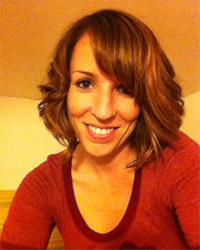
I was twenty when I found myself in a mental institution being handed a diagnosis of bipolar disorder. In that moment, I felt like a shattered version of the person I had once known myself to be. The old me had value, I thought, and was someone whom I, myself, had liked. How had I gotten there?
In the two years prior to this I had tried, unsuccessfully, to attend several colleges. Racing thoughts mixed with grandiosity were followed by the devastating inability to put a coherent string of words together on paper. Both sides of this roller coaster interrupted my attempts to manage my assignments and the stress that came with them.
I had to move back in with my parents because I could no longer take care of myself. Eventually, I became more stable. But being stable wasn’t enough to feel like my life mattered. Instead, my existence felt empty. All I saw in myself were my limitations. I couldn’t finish school and a trail of dead-end jobs had left me empty handed. It seemed that every direction I looked, there was nothing for me.
Things started to change when I met Tammy, a disabilities student service councilor at the next community college I attempted. I had returned this time to take one class for the simple purpose of something to do. I didn’t dare let myself think I was going back for real. But Tammy validated my feelings of frustration at not being able to continue my education because of my symptoms.
The first day we met she asked me a magic question: “What kind of supports do you have in your life?” I looked back at her blankly. Tammy added, “Did you know this whole office is designed especially to help people with disabilities overcome their challenges in school?” She also knew people that could help me get a job and organizations that could help me learn more about my illness and re-build my self-esteem.
This began a long series of introductions to people and organizations that had been there all along, just waiting to help me.
Flash forward ten years: I now hold a BA in Human Services and recently completed a graduate program in nonprofit leadership and management at the University of San Diego. I have become an active advocate for young adults, co-founding Impact Young Adults, a peer-run nonprofit offering social events and leadership development. A few years ago, I joined the Board of Directors of International Bipolar Foundation. My latest endeavor, ImpactMORE, partners with young adults who want more from their mental health discovery process. We support projects identified by participants that will make a meaningful difference in their community. Through this, young adults see that their contribution, and their life, matters.
All of this began when one person saw something in me that I couldn’t see myself—someone who could recover. It was not an easy road that led me to these accomplishments, and it was not due simply to luck, except for my chance meeting with Tammy. The reason I have been successful and continue to grow and accomplish the goals I set for myself is because I have taken advantage of the help that was available to me and I have hung in there. I would not have completed my undergraduate degree if I hadn’t listened to the advice of those I had grown to trust or utilized the support available to me. And I most certainly wouldn’t have completed my graduate degree if I had stopped every time I failed (which, believe me, I have!).

